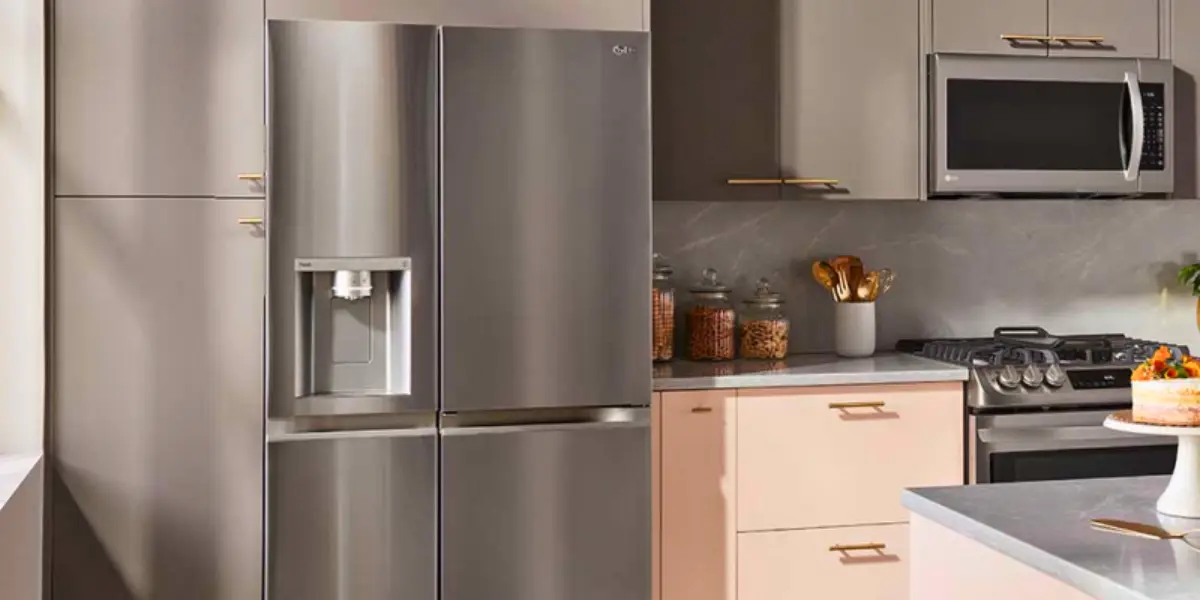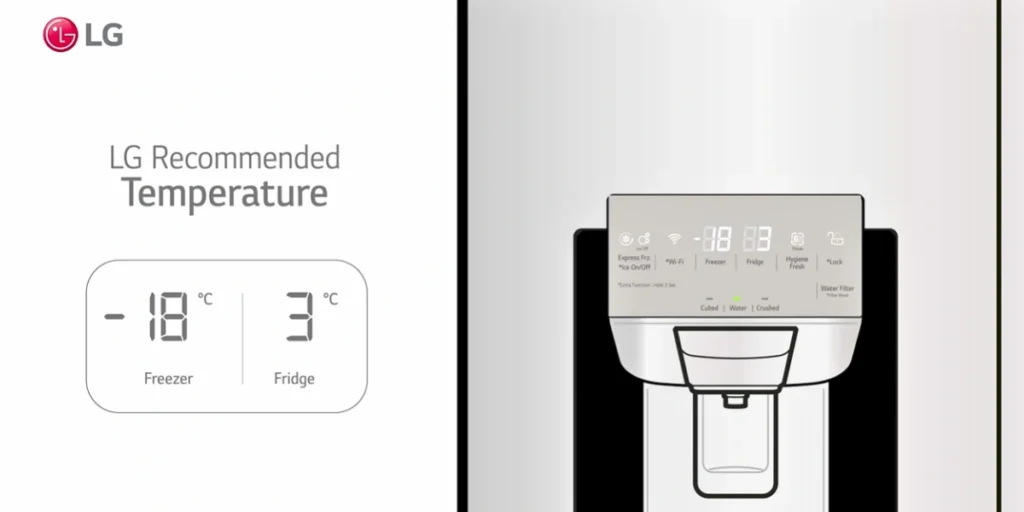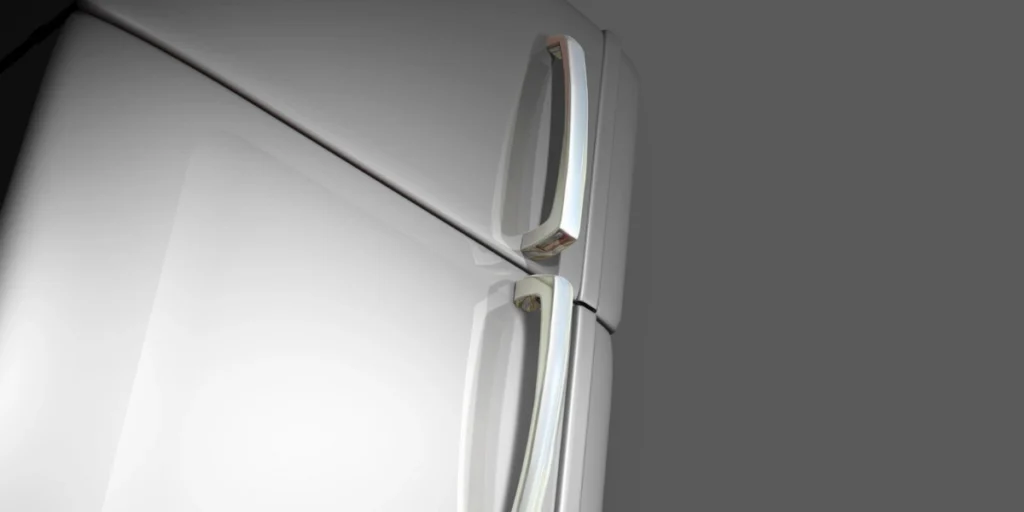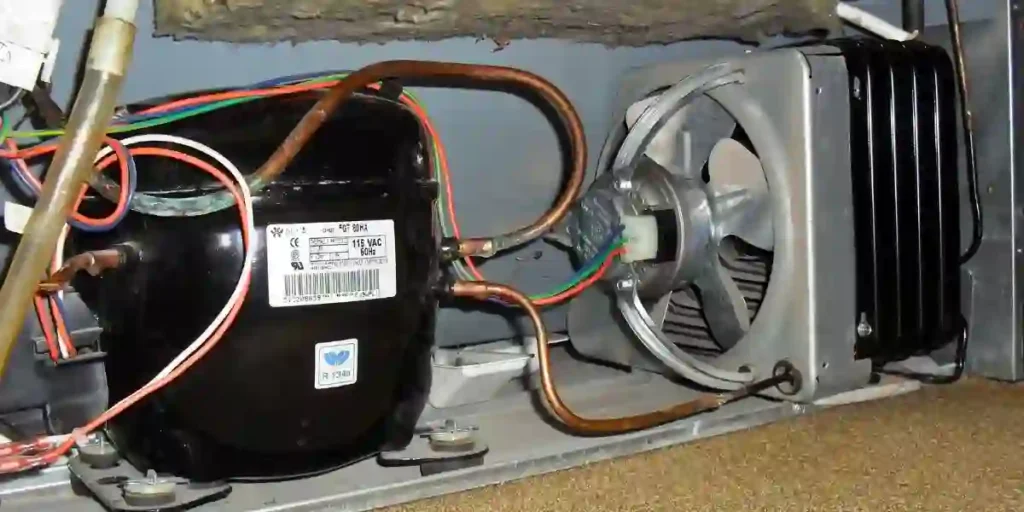LG Refrigerator Making Noise When Door Closed: Causes and Solutions
We may earn affiliate fees for purchases using our links (at no additional cost to you).
According to a study by the University of Salford, the average noise level of a refrigerator is about 40 decibels (dB), which is equivalent to a quiet library. However, some refrigerators may make more noise than others, depending on the type, model, age, and condition of the appliance. If you have an LG refrigerator that makes noise when the door is closed, you may be annoyed or concerned by it.
But don’t worry, in this article, we will explain some of the common causes and solutions of LG refrigerator noise when the door is closed.
Why Do Refrigerators Make Noise?
Refrigerators make noise because they have many moving parts and components that work together to keep your food fresh and cold. Some of these parts are:
Compressor:
The compressor is the heart of the refrigerator, and it is responsible for pumping the refrigerant through the system.
The refrigerant is a fluid that absorbs and releases heat as it changes from liquid to gas and back again.
The compressor is located at the back or bottom of the refrigerator, and it may make a humming or buzzing noise when it operates.
Fan:
The fan helps circulate cold air throughout the refrigerator and freezer compartments, and also cools down the condenser coils.
The fan is located inside the refrigerator, behind a panel in the freezer or fridge section. It may make a grinding or whirring noise if it is obstructed by ice, food items, or debris.
Condenser Coils: The condenser coils are located at the back or bottom of the refrigerator, and they help release heat from the refrigerant.
The coils may make a rattling or thumping noise if they are dirty or dusty.
Ice Maker: The ice maker is a device that produces ice cubes and stores them in a bin. It may make a clicking or knocking noise when it fills up with water or dumps ice into the bin.
Water Valve: The water valve is a device that controls the flow of water to the ice maker or the water dispenser. It may make a banging or hammering noise when it opens or closes.
Defrost Heater: The defrost heater is a device that melts the frost on the evaporator coils, which are located inside the freezer section. It may make a sizzling or dripping noise when it runs.
These noises are normal and do not indicate a problem with your refrigerator.
However, various factors can make some noises louder or more frequent, including:
Temperature:

The temperature inside and outside the refrigerator may affect the operation and performance of the appliance.
For example, if you open and close the door frequently, or if the weather is too hot or cold, the refrigerator may have to work harder and make more noise.
This is because the temperature changes may cause the compressor to cycle on and off more often, or the fan to run faster or slower, to maintain the desired cooling level.
The temperature changes may also cause the plastic parts inside the refrigerator to expand or contract and make cracking or clicking noises.
Leveling:
The leveling of the refrigerator may affect its stability and balance. If the refrigerator is tilted or wobbly, it may shake or wobble when it runs, creating a vibrating or knocking noise.
This is because the uneven surface may cause the compressor or the fan to be misaligned or unbalanced, or the doors to be loose or not closed properly.
The leveling of the refrigerator can be affected by the floor condition, the weight distribution of the food items, or the adjustment of the leveling feet.
Clearance:
The clearance around the refrigerator may affect its ventilation and vibration. If the refrigerator is too close to the wall, floor, cabinet, or other objects, it may not have enough air circulation and heat dissipation.
This may cause the refrigerator to overheat and make more noise. This may also cause the refrigerator to vibrate against these objects and create a buzzing or rattling noise.
The clearance of the refrigerator can be affected by the placement of the appliance, the movement of furniture, or the accumulation of dust or dirt.
Door Gasket:
The door gasket is a rubber seal that prevents air from leaking out of the refrigerator. If the door gasket is loose or damaged, it may cause air to leak and create a whistling noise.
To fix this, you need to inspect and replace the door gasket if necessary. You can find the door gasket on the edge of the door, and you can use a screwdriver to remove and install it.
Water Filter:
The water filter is a device that removes impurities from the water that goes to the ice maker or the water dispenser.
If the water filter is clogged or needs to be replaced, it may cause a humming or buzzing noise when the water dispenser is used.
To fix this, you need to replace the water filter every six months or as recommended by the manufacturer.
You can find the water filter inside the refrigerator, usually in the upper right corner or behind the vegetable drawer. You can use a twist or push button to release and install it.
Light Switch:
The light switch is a device that turns on and off the light inside the refrigerator when the door is opened or closed.
If the light switch is stuck or broken, it may cause a flickering or buzzing noise when the door is opened or closed.
To fix this, you need to replace the light switch with a new one. You can find the light switch on the top or side of the refrigerator, and you can use a screwdriver to remove and install it.
Temperature Control:
The temperature control is a device that regulates the temperature inside the refrigerator and freezer sections.
If the temperature control is set too high or low, it may cause a clicking or tapping noise as the thermostat cycles on and off.
To fix this, you need to adjust the temperature control to the optimal level for your food storage needs.
The recommended temperature for the fridge section is between 37°F and 40°F, and for the freezer section is between 0°F and 5°F.
How to Fix LG Refrigerator Noise When Door Closed?

Here are some of the common types of noises from LG refrigerators and their corresponding causes and solutions:
Hissing or Gurgling Noise: Refrigerant Flowing
This is the sound of the refrigerant flowing through the pipes inside the refrigerator. It is a natural sound that occurs when the compressor operates and does not indicate a problem.
However, if you hear this noise constantly or excessively, you may need to check if there are any leaks in the system that may affect the cooling performance of the refrigerator.
You can use a soap solution to spray on the pipes and look for bubbles that indicate leaks. If you find any leaks, you should call a professional for repair.
Cracking, Clicking or Water Dripping Noise: Temperature Change
This is the sound of the plastic parts inside the refrigerator expanding or contracting due to temperature changes.
It may also be the sound of water dripping from the defrost heater or the ice maker . It is a normal sound that does not indicate a problem.
However, if you hear these noises constantly or excessively, you may need to check if there are any loose parts that may cause vibration.
You should also make sure that your refrigerator is set to the optimal temperature for your food storage needs.
The recommended temperature for the fridge section is between 37°F and 40°F, and for the freezer section is between 0°F and 5°F.
Rattling, Thumping or Humming Noise: Compressor or Fan Running

This is the sound of the compressor or the fan when they start or stop running. It may also be the sound of the ice maker filling or dumping ice.
It is a normal sound that does not indicate a problem, unless it is too loud or frequent. If you hear a loud rattling or thumping noise, it may indicate that the compressor is faulty or worn out.
This may affect the cooling performance and efficiency of the refrigerator, and it may require professional repair. If you hear a grinding or whirring noise, it may indicate that the fan is obstructed by ice, food items, or debris.
This may prevent the proper circulation of cold air and cause frost buildup or uneven cooling.
To fix this, you need to remove any obstructions from the fan and clean it regularly. You can access the fan by removing the back panel inside the freezer or fridge section.
You should also check if there are any loose screws or wires that may cause vibration.
Banging or Hammering Noise: Water Hammering
This is the sound of water hammering, which occurs when water suddenly stops flowing through a pipe.
It may happen when the refrigerator fills the ice tray or dispenses water. It is an abnormal sound that indicates a problem with the water valve, pipes, or pressure.
To prevent water hammering, you can install a water hammer arrestor, which is a device that absorbs the shock wave and reduces the noise.
You can also adjust the water pressure by turning the valve behind the refrigerator or under the sink.
You should also check if there are any leaks or kinks in the water line that may affect the water flow.
Vibrating or Knocking Noise: Insufficient Clearance or Unlevel Refrigerator
This is the sound of the refrigerator vibrating against the wall, floor, cabinet, or other objects. It may also be the sound of the doors being misaligned or unstable.
It is an abnormal sound that indicates a problem with the clearance, leveling, or alignment of the refrigerator.
To fix this, you need to adjust the leveling feet at the bottom of the refrigerator until it is balanced and stable.
You can use a level tool to check if the refrigerator is even on all sides. You should also avoid placing anything heavy on top of the refrigerator that may cause imbalance.
You should also make sure that there is at least 2 inches of clearance on each side and 4 inches at the back of the refrigerator.
You should also avoid placing anything on top of the refrigerator that may cause vibration.
FAQs about LG Refrigerator Noises
What Are The Common Noises From An LG Refrigerator When The Door Is Closed?
They are typically normal. They often come from the refrigerator’s compressor or fan.
Why Does My LG Refrigerator Make A Popping Noise?
Is It Normal For My LG Refrigerator To Make A Buzzing Sound?
What Does A Clicking Sound From My LG Refrigerator Indicate?
How Can I Reduce The Noise From My LG Refrigerator?
Are Refrigerator Noises Covered Under LG’s Warranty?
However, if you suspect a faulty component causing excessive noise, check the warranty terms or contact LG customer service for assistance.
Conclusion
There are many possible reasons why your LG refrigerator is making noise when the door is closed.
Some of these reasons are easy to fix by yourself, while others may require professional help.
By following this guide, you can identify and resolve some of the common causes of refrigerator noise and enjoy a quieter and more efficient appliance.
If you have any questions or need more assistance, please feel free to contact LG customer service at 1-800-243-0000 or visit their website at [www.lg.com].
You can also find more information and tips on their online forums at [https://lgcommunity.us.com/].